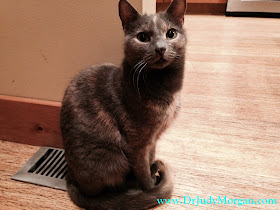 |
| Eggplant on the heat vent, her favorite spot |
Yang supplies warmth and energy, so many times these animals have difficulty getting going. They may lie down a lot, have weak hindquarters (with or without arthritis), and move slowly with the hind end lower, almost crouched. These pets rarely pant (unless stressed) and have a pale, wet tongue. They may have a drippy nose.
Eggplant is one of our kitties. She is middle aged and her favorite place to sit or sleep is on the heat vent. She finds every sunny spot in the house and loves to lie on the lounge chairs by the pool on 90-degree summer days in full sun. Our older dog Freckles wears a coat all year long. She has weak hindquarters and leaks urine. When fed meals that are warm (temperature) and warming from the interior (Yang tonics), her urine leakage is much less. If we feed her "Yin tonics", or cooling foods, she leaks huge puddles of urine and has more hind end weakness.
 |
| Sleeping on a blanket in her coat |

No comments:
Post a Comment